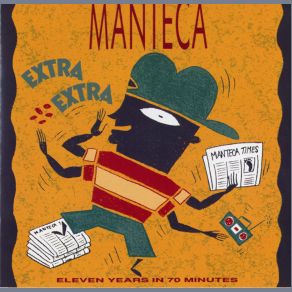Extra Extra
Download links and information about Extra Extra by Manteca. This album was released in 1992 and it belongs to Hip Hop/R&B, Soul, Jazz, Crossover Jazz, Latin, Pop, Funk genres. It contains 14 tracks with total duration of 01:09:55 minutes.

|
|
|---|---|
| Artist: | Manteca |
| Release date: | 1992 |
| Genre: | Hip Hop/R&B, Soul, Jazz, Crossover Jazz, Latin, Pop, Funk |
| Tracks: | 14 |
| Duration: | 01:09:55 |
| Buy it NOW at: | |
| Buy on iTunes $9.99 | |
Tracks
[Edit]| No. | Title | Length |
|---|---|---|
| 1. | Extra Extra | 4:43 |
| 2. | Nu Nu | 5:09 |
| 3. | Beau Soliel en Soleil | 4:38 |
| 4. | Ananconda | 4:50 |
| 5. | Perfect Foot | 4:10 |
| 6. | Danceteria | 4:26 |
| 7. | Avoco | 4:41 |
| 8. | Strength In Numbers | 5:29 |
| 9. | Benin Road | 2:59 |
| 10. | Heart of Darkness | 4:20 |
| 11. | Jungle Beast | 4:18 |
| 12. | Bee Line for Bob | 3:22 |
| 13. | MCT | 4:57 |
| 14. | Ruwenzori | 11:53 |
Details
[Edit]When a band is named after a Latin jazz standard that Dizzy Gillespie and Chano Pozo unveiled in the '40s, one immediately thinks "Afro-Cuban." But Manteca was never a band that played Afro-Cuban jazz exclusively. Spanning 1980-1990, this collection shows listeners just how far-reaching and experimental the Canadian outfit can be. Extra Extra underscores Manteca's willingness to incorporate a wide variety of influences, and there is a big difference between Manteca's fusion and the sort of acoustic Afro-Cuban jazz one associates with Gillespie, Tito Puente, Poncho Sanchez, Cal Tjader, and Mongo Santamaria. For one thing, Extra Extra isn't hard bop — while Gillespie and Sanchez's Latin jazz is primarily a blend of bop and Afro-Cuban rhythms, Manteca is a fusion band that combines jazz with rock, funk, and a variety of world music. Are Afro-Cuban rhythms a high priority on this CD? Absolutely; the Afro-Cuban influence is impossible to miss on gems like "Beeline for Bob," "Avoco," "MCT," and "Anaconda." But Manteca is also influenced by everything from Brazilian samba on "Nu Nu" to Afro-pop on the mysterious "Heart of Darkness," which brings to mind the moodier, duskier styles of Afro-pop that have come out of Ethiopia and the Sudan. Meanwhile, "Beau Soliel en Soleil" manages to draw on both salsa and Tex-Mex/norteño. "Beau Soliel en Soleil" sounds like the sort of title one might expect from one of Louisiana's Cajun or zydeco bands, but the tune has the type of polka influence heard in Tex-Mex/norteño (an interesting hybrid that is influenced by both Mexican ranchera music and the polka that German immigrants brought to southern Texas.) Full of surprises, Extra Extra is enthusiastically recommended to novices who are interested in exploring Manteca's fusion for the first time.